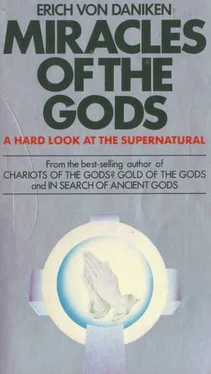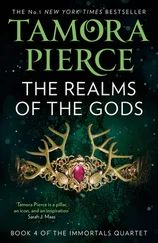Erich Daniken - Miracles of the Gods
Здесь есть возможность читать онлайн «Erich Daniken - Miracles of the Gods» весь текст электронной книги совершенно бесплатно (целиком полную версию без сокращений). В некоторых случаях можно слушать аудио, скачать через торрент в формате fb2 и присутствует краткое содержание. Жанр: Физика, на английском языке. Описание произведения, (предисловие) а так же отзывы посетителей доступны на портале библиотеки ЛибКат.
- Название:Miracles of the Gods
- Автор:
- Жанр:
- Год:неизвестен
- ISBN:нет данных
- Рейтинг книги:4 / 5. Голосов: 1
-
Избранное:Добавить в избранное
- Отзывы:
-
Ваша оценка:
- 80
- 1
- 2
- 3
- 4
- 5
Miracles of the Gods: краткое содержание, описание и аннотация
Предлагаем к чтению аннотацию, описание, краткое содержание или предисловие (зависит от того, что написал сам автор книги «Miracles of the Gods»). Если вы не нашли необходимую информацию о книге — напишите в комментариях, мы постараемся отыскать её.
Miracles of the Gods — читать онлайн бесплатно полную книгу (весь текст) целиком
Ниже представлен текст книги, разбитый по страницам. Система сохранения места последней прочитанной страницы, позволяет с удобством читать онлайн бесплатно книгу «Miracles of the Gods», без необходимости каждый раз заново искать на чём Вы остановились. Поставьте закладку, и сможете в любой момент перейти на страницу, на которой закончили чтение.
Интервал:
Закладка:
When the bodies of illustrious ecclesiastics turned to dust after being exposed to profane human eyes, it was definitely not a 'sign from God', according to Dr. Kaiser. Once the grave was opened, the conditions restraining decomposition created at the time of interment were interrupted and ended. For example, St. Vincent de Paul crumbled to bits as the result of a sudden influx of air when his coffin was opened twenty-five years after his burial. 'Rediscovered tombs of ordinary Etruscans, to whom no one attributed particular saintliness, showed the same phenomenon. The corpses which rested undamaged on their stone beds, turned into dust during the exploration of the catacombs. A sweetsmelling golden haze is supposed to have filled the room.'
If the wealthy Catholic Church, which is so worried about the inviolability and divine exaltation of its saints, were to set up a research foundation to examine the post-mortem remains of holy bodies on a broader basis, I should think it an excellent idea and a brave gesture.
Then perhaps we should have an answer some day to the Viennese scholar's tricky question: 'Why should God preserve the bodies of precisely those men whose souls he took to himself by the shortest way?'
Even Jesus, the Master, did not believe in miracles ... but he knew the effect of suggestion!
Mark (5:23 et seq.) tells us that a woman who lay at the point of death came to him. Jesus' fame as a miraculous healer, preceded him and prepared the ground for his direct suggestions. He was asked to lay his hands on her so that she could be cured, for she had suffered from an 'issue of blood' for twelve years. She had spent a lot of money on doctors who had been unable to help her. As usual the crowd surrounded the master expectantly. They wanted to see a miracle I And the sick woman wanted to experience a miraculous cure!
'For she said, If I may but touch his clothes, I shall be whole' (28).
The prerequisite of her readiness to be healed miraculously existed.
'And straight away the fountain of her blood was dried up; and she felt in her body that she was healed of that plague.'
Jesus knew exactly whence the effect attributed to him came, for he asked who had touched his clothes.
'And he looked around to see her that had done this thing' (32).
The miraculous healer explained the mystery of the cure in a very modern and relevant way!
'Daughter, thy faith hath made thee whole; go in peace and be whole of the plague.'
The Nazarene knew nothing about the mechanism of auto, or heterosuggestion, but he had a good idea of their miraculous effects. If present-day faith-healers take the Bible as a textbook, they can find many good hints in it. 'No one really likes suffering. If he does, he is not really suffering but submissively enjoying his pain. Enjoying the blows as absolutely necessary for his psychic expansion. The martyred look of suffering appears to be calm and even shows a sneaking feeling of gratitude,' says Ernest Bloch
[38] and his assertions tally with my observations.
When I am urged to show more respect for religions, I can assure people with conviction and from the heart that I respect every religion which also respects its followers.
But where the ignorance of church members is despised and shamelessly exploited, where hocus-pocus goes on with miracles that are not miracles, where jingling coins are struck from manipulated faith, where religions coerce adherents in this world by threats of punishment in the world to come, in all such cases I cannot respect religions, whatever their nature. I strive to be sincere and would like to help those who, like me, were caught from childhood in the power of a religious doctrine from which there was apparently no escape - except at the cost of eternal damnation.
Liberation from the confessional shackles by no means implies abandonment of faith in a god as the moving principle behind all being.
No! 'Miraculous cures' are no proof of the authenticity of a vision. In order to throw light on the darkness surrounding the mystery of supposed miracles, we must try to get on the trail of the visionary phenomena that are supposed to cause them.
Chapter Four - Visions Do Exist - My Explanation
This they begin to do: and now nothing will be restrained from them, which they have imagined to do.
(Genesis 11:6)
Visions are real - they do exist.
Visions originate in intelligent brains.
Every intelligent brain has the prerequisites for creating visions.
The impulse for producing visions is of extraterrestrial origin.
Religious visions originate through an ideal that the visionary has within him and is suggested by his religious environment.
Do these theses of mine conceal a mass of contradictions? It might appear so at first sight. But in order to provide proofs for my theses, I must build on the basis of my theory.
Present-day astrophysics puts forward three theories of the origin of the universe [1]: the Big Bang theory, the Steady State theory and the Oscillation theory. None of these three (or other) theories on the origin of the world explains where the mysterious original matter of the whole universe comes from and what was present before it came into being. Nothing originates from nothing.
Just as it does not matter for my thesis which of these theories may ultimately turn out to be valid, it is also unimportant to me whether the origin of the universe dates back five, ten or twenty milliard years, or whether matter is finite or infinite, or whether it constantly renews itself. My question is: what did original matter originate from?
In public discussions I have made use of a graphic image to explain my views on this question in simple terms. I suggested that my hearers imagine a computer with a hundred milliard thought-units
(bits in computer jargon), a computer that can think, i.e. has a 'personal consciousness' (Professor Michie, Edinburgh University). This consciousness is attached to milliards of circuits: it would be destroyed if the computer exploded. Our computer is highly intelligent and capable of, ultra-rapid combinations. There is nothing it does not know.
In spite of its consciousness and omniscience the thinking computer is not 'happy', for in spite of its tremendous performance there is something it cannot think out, reckon out or work out, namely experience. But it wants to amass experience. As it has no rival of anything like the same calibre to obtain experience from, it decides to send the hundred milliard bits off its central body out to get information by exploding itself knowing perfectly well that it would definitely lose its personal consciousness by so doing ... if it had not in its insuperable cleverness programmed the future after its self-destruction long beforehand.
Before the bits are catapulted on their long journey to gain experience, the clever computer has programmed magnetic impulses inside them with the order to reassemble at x place at y time. When this hour strikes, the milliards of bits obediently return to the complicated machinery with its 'personal consciousness' and bring home experiences, like bees bringing honey to the hive.
From the moment of the explosion to the moment of the return no bit 'knew' that it was and would now be again a minute part of a larger consciousness. If a single bit with its minimal capacity for thought could ask the question: 'What is the purpose of my breakneck journey?' or 'Who created me, where do I come from?', there would be no answer. Thus the tremendous journey was the beginning and end of an act, a kind of 'creation' of consciousness multiplied by the factor EXPERIENCE.
This bold comparison from the arsenal of science-fiction is meant as an aid in tracking down the phenomenon which existed before original matter. Terrible simplificateur! I beg your pardon, but it gets us a little further.
Читать дальшеИнтервал:
Закладка:
Похожие книги на «Miracles of the Gods»
Представляем Вашему вниманию похожие книги на «Miracles of the Gods» списком для выбора. Мы отобрали схожую по названию и смыслу литературу в надежде предоставить читателям больше вариантов отыскать новые, интересные, ещё непрочитанные произведения.
Обсуждение, отзывы о книге «Miracles of the Gods» и просто собственные мнения читателей. Оставьте ваши комментарии, напишите, что Вы думаете о произведении, его смысле или главных героях. Укажите что конкретно понравилось, а что нет, и почему Вы так считаете.











